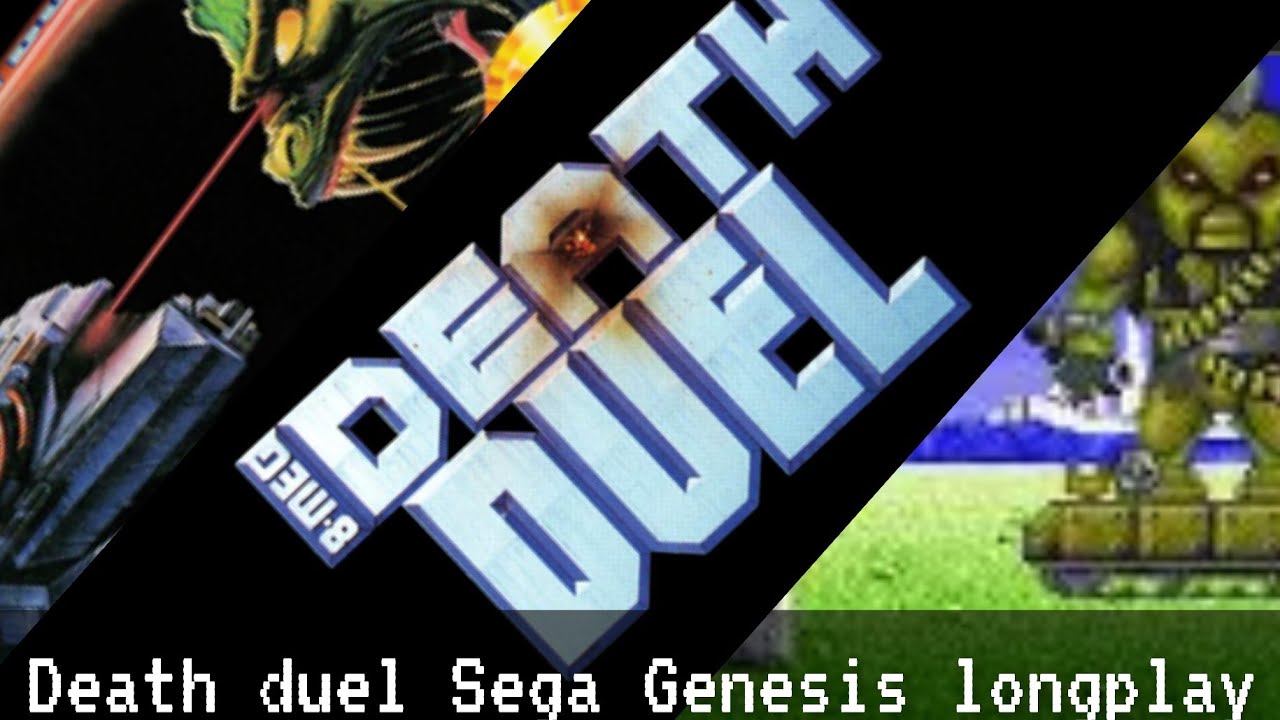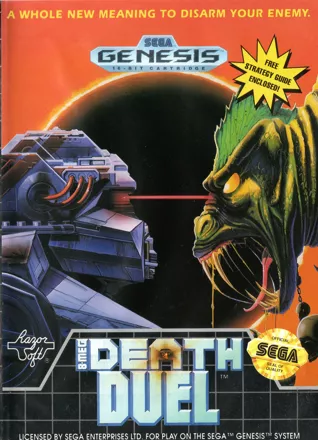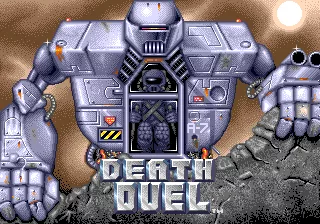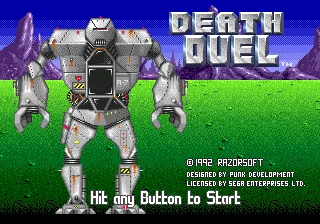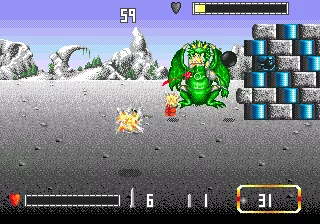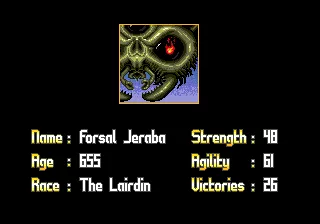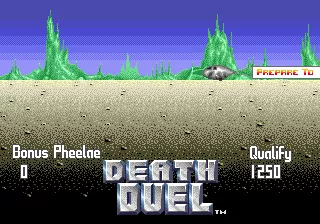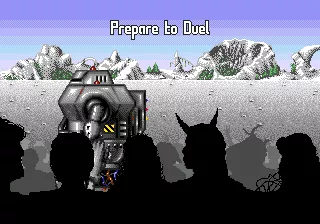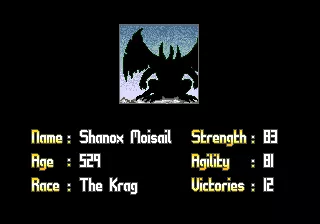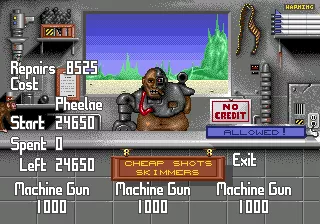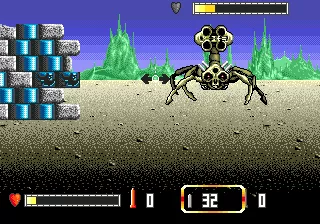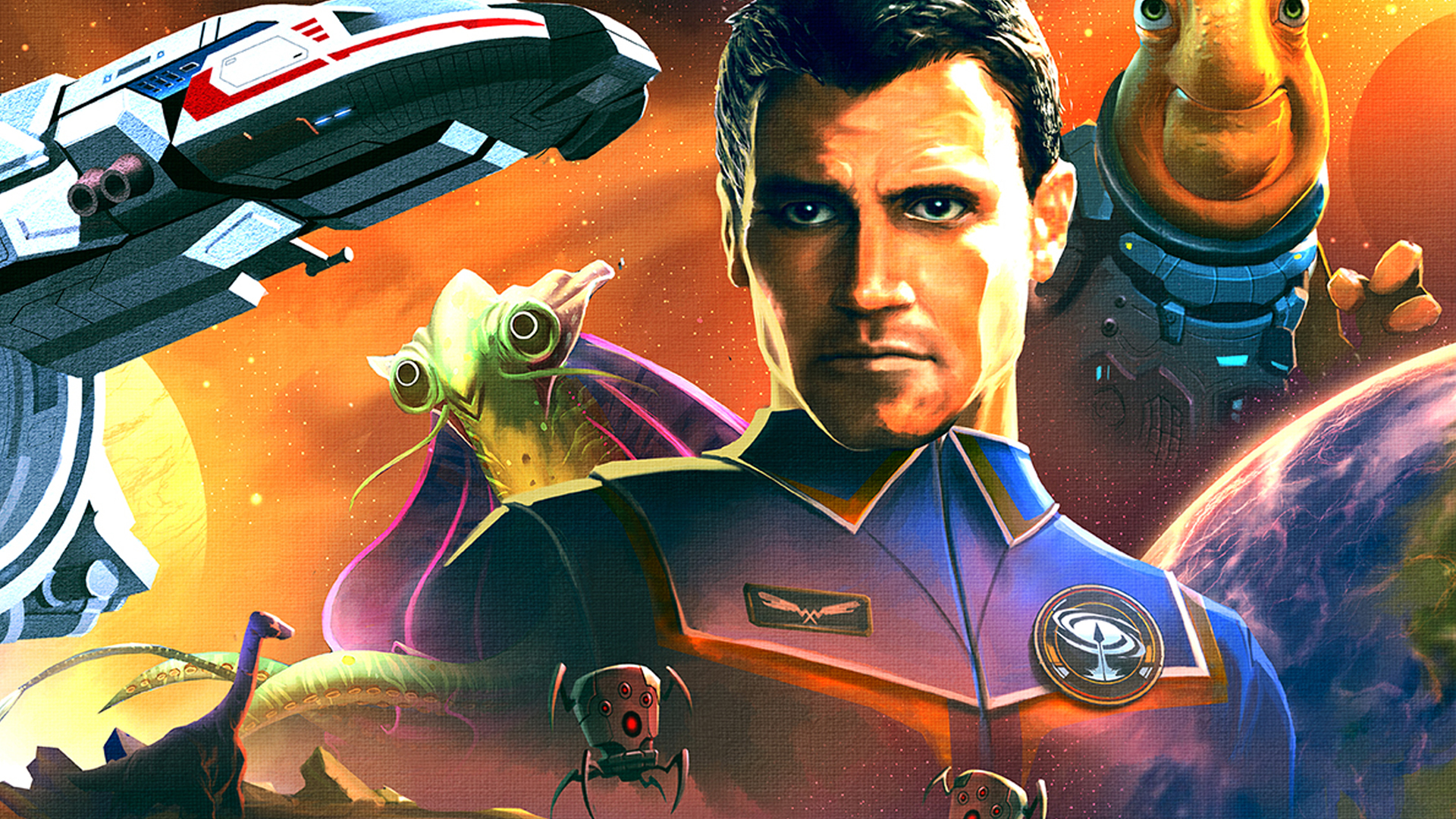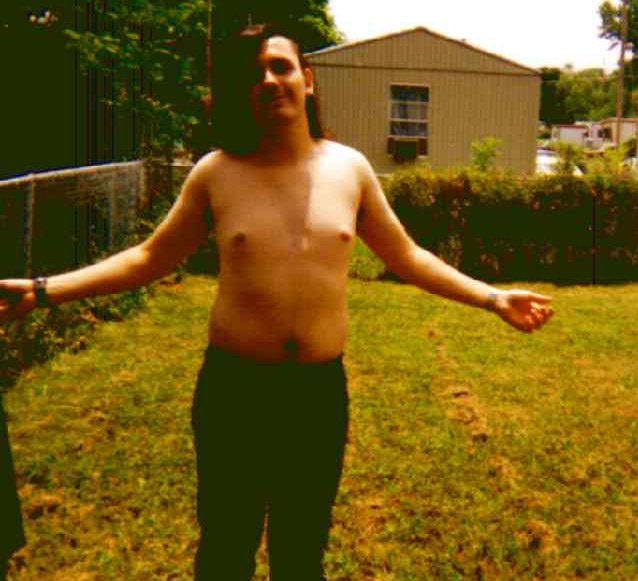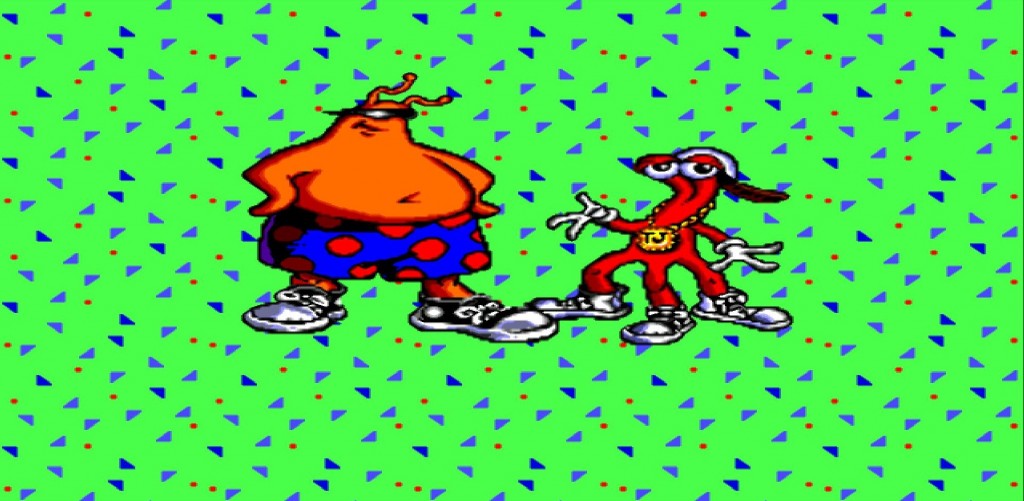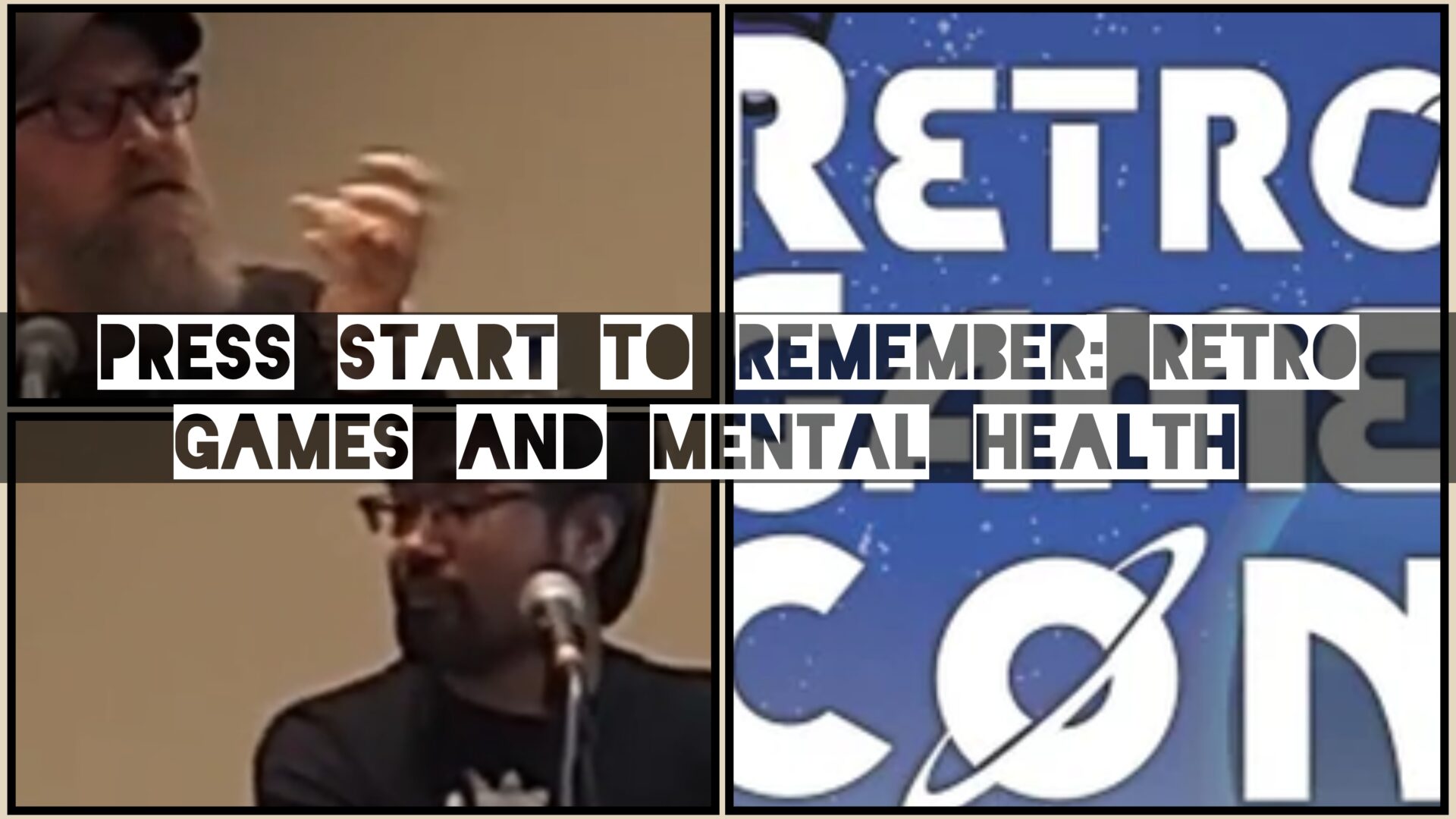We reviewed this game back in 2010, if you wish to read the old review.
(HEY YOU!! We hope you enjoy! We try not to run ads. So basically, this is a very expensive hobby running this site. Please consider joining us for updates, forums, and more. Network w/ us to make some cash or friends while retro gaming, and you can win some free retro games for posting. Okay, carry on 👍)
Death Duel: A Sega Genesis Cult Classic Revisited
The Sega Genesis, remembered by many as the darker, cooler sibling in the early nineties console wars, had a knack for attracting games that pushed boundaries. While Nintendo carried the family-friendly banner, Sega opened its doors to publishers that were willing to test the limits of violence, style, and humor in video games. Nestled among the system’s library was a strange release from 1992 called Death Duel. Developed by Punk Development and published by RazorSoft, it was not just another shooter or fighter. It was a first-person mech duel simulator wrapped in gore, crude humor, and a strange sense of self-importance. For kids who stumbled onto it in rental shops, it felt like something dangerous, a game that seemed to wink and whisper, “you’re not supposed to be playing this.” And make sure to check out our full feature, “The History of Death Duel”.
Even today, Death Duel occupies an odd space in the Genesis library. It never earned the attention of Sega’s flagship titles, nor did it become a household name like Mortal Kombat or Street Fighter II. But for those who played it, the memories are sharp. It was a game where alien limbs exploded in sprays of blood, where a holographic announcer taunted you between duels, and where defeat meant being scolded by the Grim Reaper in one of the harshest game over screens of the era. That mix of mechanics, style, and sheer audacity is why it still resonates decades later.
The Developer and Its Vision
Punk Development was hardly a household name, even among Genesis diehards. It was a small California studio that worked under the umbrella of RazorSoft, a publisher infamous for courting controversy. RazorSoft had already made waves with games like Stormlord and Slaughter Sport, both remembered less for their gameplay and more for their attempts at risqué imagery and gore. Death Duel would be RazorSoft’s final original creation, and in hindsight, it feels like the ultimate statement of the company’s identity. It was brash, juvenile, violent, and yet strangely ambitious.
The team behind Punk Development poured their effort into making something that did not feel like another side-scroller or arcade port. They wanted to experiment with perspective, immersion, and strategy. By placing players inside a cockpit, facing monstrous aliens head-on, they aimed to deliver something closer to a science fiction duel than a traditional action game. It was rough around the edges, but it showed the kind of creative risks that smaller studios of the era were willing to take.
Looking back, the game’s vision feels almost prophetic. Later mech games, such as MechWarrior 2 or Armored Core, would refine the idea of dismantling enemies piece by piece, and cockpit views would become a standard way of pulling players deeper into the action. But in 1992, this was uncharted territory for a Genesis game. Punk Development may not have built a franchise, but they did leave behind an experiment that showed where the genre could go.
Graphics and Sound
Upon booting up Death Duel, players were met with visuals that tried hard to make an impression. Each of the nine alien foes in the Super Nine was distinct, ranging from insectoid horrors to hulking biomechanical beasts. Limbs could be blasted off in showers of sparks or gore, and enemies reacted to damage in ways that felt more alive than the average Genesis boss fight. The backdrops themselves were simple, but the grotesque character art carried much of the weight.
The real talking point was not the enemies, however, but the presentation around them. Before every duel, players were greeted by Reegus, a holographic hostess who announced battles with a smirk and a wardrobe that was clearly designed to scandalize parents. Between fights, players visited a weapon shop run by a grotesque clerk and his pet monkey, surrounded by crude signage. The entire game leaned into the aesthetic of late-night cable programming, with just enough gore and innuendo to make it feel like something you should not be watching.
Sound was less impressive. The duels themselves were nearly silent, accompanied only by a pulsing mechanical beat that quickened as you took damage. There were no soaring melodies or memorable jingles. For some, this stripped-down atmosphere actually added tension, making the duels feel like cold, industrial fights. For others, it left the game feeling barren compared to the rich soundtracks of Streets of Rage or Thunder Force IV. Either way, the combination of grotesque art and eerie sound carved out a unique identity that few have forgotten.
Gameplay Mechanics
At its heart, Death Duel was all about learning your enemies. Each duel placed you in a small arena with a single alien opponent. Ammunition was finite, time was limited, and survival depended on precision. You could not simply unload every weapon and expect victory. Instead, you had to dismantle your foe piece by piece, crippling legs to stop movement, blasting off weapons to silence their attacks, and finally delivering a finishing blow to the head or core.
What made this loop more interesting was the economy between fights. After every duel, players earned currency, called Phaelee, which was then spent on ammunition, repairs, and upgrades. This added a layer of strategy rare in action games of the time. Wasting ammo in one fight meant entering the next one underprepared, and overspending on the wrong weapon could doom your chances before you even began. The weapon balance was not perfect — grenades were notoriously hard to aim and situational items felt like traps — but the shop system gave every purchase weight.
The arenas themselves also added a wrinkle. Barricades offered cover but could also shield your enemies. More than one player has lost a fight because a nearly defeated opponent hid behind a slab until the timer ran out. Combined with the odd crosshair system, which required players to switch modes between strafing and aiming, the game demanded patience and practice. It was not accessible in the way other shooters were, but it rewarded persistence.
The Story
The lore of Death Duel was surprisingly elaborate for its time. Set in the year 2140, it imagined a galaxy where open war had been outlawed. Instead, disputes between empires were settled through one-on-one duels. The fate of entire civilizations rested on the shoulders of a single champion. Humanity’s representative was Barrett Jade, a mercenary pilot tasked with keeping Earth’s trade routes open by defeating the Super Nine in ritual combat.
This setup gave the game a sense of weight that most action titles of the early nineties lacked. These were not random battles against cartoon villains. They were political events dressed up as gladiatorial sport, where the death of one fighter could determine the destiny of billions. Even if players ignored the manual and skipped the text, the presence of Reegus, the alien designs, and the looming stakes created a sense that something larger was happening.
It was pulp science fiction filtered through arcade gameplay, the kind of premise that felt like it belonged in a comic book or a VHS movie rental. That mix of seriousness and absurdity gave the game a personality all its own.
Player Reactions and Facts
Reception at release was mixed. Some players praised its originality and unflinching embrace of gore and dark humor. Others dismissed it as clunky and tasteless. Over the years, however, the game has grown into a cult favorite. Retrospective reviews often land in the middle of the scale, calling it flawed but memorable. The infamous game over screen, where the Grim Reaper chastises you for dooming your people, has been cited as one of the harshest and most unforgettable of its era.
Here are a few facts about Death Duel that highlight its uniqueness:
- It was one of the few Genesis games to use a first-person perspective in one-on-one combat.
- The duels could take place at different times of day, with visibility changing between light and dark arenas.
- The game rewarded “clean hits” on weak points with more damage, encouraging precision over spam.
- A bonus stage between fights allowed players to earn extra money by shooting targets, which was then spent on repairs and weapons.
For those who enjoyed the game, these quirks were part of its charm. For others, they were simply barriers to entry. That divide is part of why the game endures as a cult classic rather than a mainstream success.
Replay Value
Replay value in Death Duel came largely from its difficulty. This was not a game you could master in a weekend rental. Learning the weak points of each alien, budgeting your money for the right weapons, and managing your repairs created a steep but rewarding curve. Many players who stuck with it found satisfaction in finally dismantling an enemy they once thought impossible.
The randomness of shop discounts and the trial-and-error nature of weapon choices added to the challenge. Sometimes you would pick the perfect tool and breeze through a fight. Other times you would discover, too late, that your expensive loadout was useless against a specific foe. That sense of gambling gave each run an unpredictable tension.
Community memories capture this feeling best. One Retro Replay member, Jonathan “BlastMaster” Simmons, summed it up when he said:
“Back in the day, Death Duel was my jam. It was this perfect storm of gory action and dark humor that my friends and I loved. The game was tough as nails, but it was the laughter and the thrill of the duel that kept me coming back.”
Personal Ties and Legacy
For me, Death Duel is tied to a personal memory. I owned the game as a kid, though I cannot recall if I asked for it or if my mom chose it for me. Either way, it became part of my childhood collection. I remember laughing at the absurdity of enemies, grimacing at the harsh defeat screens, and marveling at the over-the-top gore. It was not just a game, it was an experience that stood out from the rest of my Genesis shelf.
The legacy of Death Duel is not one of mainstream success. It did not inspire sequels, and it did not shape the industry. But it did prove that smaller studios could take risks, could experiment with perspective and tone, and could create something that, flaws and all, left a mark on those who played it. It remains a time capsule of the early nineties, when the console wars were still raging and developers were free to try things that larger publishers would never have allowed.
In conclusion, Death Duel was a product of its era, bold, brash, and rough around the edges. It is a game that makes you laugh, shocks you, and frustrates you, sometimes all in the same duel. It may not sit at the top of the Genesis library, but for those of us who played it, it is unforgettable. God bless my mom’s soul, because whether knowingly or not, she picked a game that gave me memories that still matter today.
The verdict
Graphics - 83%
Sound - 89%
Gameplay - 82%
Replay value - 85%
85%
Back in the day, 'Death Duel' was my jam. It was this perfect storm of gory action and dark humor that my friends and I loved. The game was tough as nails, but it was the laughter and the thrill of the duel that kept me coming back.
 Retro Replay Retro Replay gaming reviews, news, emulation, geek stuff and more!
Retro Replay Retro Replay gaming reviews, news, emulation, geek stuff and more!
